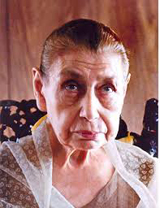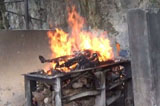Notes on counselling
Dealing with bereavement
Abstract
We are seldom taught how to deal with bereavement. Bereavement is associated not only with psychological issues but also has occult implications. Moreover the soul-principle which departs at demise can leave earlier leaving subjects to survive out of habit under the influence of the spirit of the form. A hurry in performing last rites can leave the subtle disengagement of consciousness incomplete. Such sensitive issues need to be appreciated to understand how to deal with the phenomenon of bereavement. Unconscious mourning can prolong depression in vulnerable subjects. Finally one must learn how not to grieve for there can be conscious remembrance without mourning.
Bereavement is one of the most sensitive areas in counselling. We are taught many things in life but we seldom are taught how to face death. Not only that. Our social structures are very organised in terms of marriage and child rearing but seldom address issues with the same zeal and fervour when a hapless young lady is widowed or when a child is suddenly deprived of the person who was not only the single breadwinner in the family but the main source of social and psychological security.
Indeed, there are some societies where taboos on the bereaved, especially widows still exist, resulting not only in social ostracising but financial distress. There were corrective attempts like levirate marriage initiated by the Jews facilitating automatic marriage to the deceased husband’s brother but such practices are becoming rare as societies shift to the individualistic phase.
Crisis
The quiet and peaceful death of an elderly subject can be borne with spontaneity and ease. When a subject of any age is suffering from a terminal illness, his or her fellow-beings have some time to prepare for the impending doom. Things are different when there is a sudden unexpected demise — an accident or a suicide or a very short illness. The dimension of shock changes further when one is in the midst of a natural calamity like flood or earthquake with death all around. Gerald Caplan of the Laboratory of Community Psychiatry of Harvard Medical School used the term “crisis” for major life stresses of limited duration that endangered mental health. Such crises are inevitable in life and call for sensitive psychological intervention. Crises are challenging as both the affected subject and the counsellor have an opportunity to transcend age-old assumptions and discover new ones (1). For psychologists, intervention in crisis situations like natural disasters and insurgency zones need to be designed so as to reduce the risk of post-traumatic stress disorders in later life.
Occult effects
Along with the psychological factors that are associated with bereavement, there are occult factors that are seldom understood. Thus when an eight-year-old girl died suddenly of a short fever, her mother had gone berserk but for the first few days, everyone else in the family “felt” the presence of the deceased girl and reported how small events were happening in the house (like a fan seemed to be switched on automatically) which were usually initiated by the girl when living. The mother was not acknowledging that her daughter was no more till she dreamed after a week of her daughter resting on the lap of SSiva. She was convinced that she would have to try to be pregnant once again so that her deceased daughter would be reborn in her womb. Such a piquant situation cannot be assessed only in terms of psychopathology while ignoring the occult ramifications.
In fact, it is occult knowledge that even after clinical death, the consciousness takes time to get fully disconnected from the body. And after the material body has been disposed, the subtle body and also other subtle parts of the consciousness can remain in the same atmosphere. This is why in the case cited above, the family members were witnessing things that would have been done by the deceased girl when alive. Of course, this phenomenon lasted less than a week.
The Mother, while describing the case of Benjamin, an Ashram inmate explained how such experiences occur:
“Did you know Benjamin?... His psychic being1 had left him quite some time ago and, as a result, to the surface consciousness he seemed a bit deranged — he wasn’t deranged but diminished. And he lived, as I said, out of habit. The physical consciousness still held a minimum of vital and mind and he lived out of habit. But the remarkable thing is that sometimes, for a few seconds, he would live admirably, in full light, while at other times he couldn’t even control his gestures. Then he left altogether: all the accumulated energy dwindled little by little, little and little, and whatever remained left his body. It was just on his birthday, on December 30 (the night of December 30). He left. So they did as is always done: they cleaned his room, took out the furniture. Since then there had been no sign of him. Yesterday evening, after dinner (which is about the same time he left twelve days ago), I was in concentration, resting, when suddenly here comes a very agitated Benjamin who tells me, “Mother, they’ve taken all the furniture out of my room! What am I to do now!?” I told him gently, “Do not fret, you don’t need anything more.” Then I put him to rest and sent him to join the rest of his being.
Which means it took twelve days for all his elements to form again. You see, they burned his body. (He was Christian, but family — his wife is alive and his brother too — found it less costly to let us handle it than to bury him as a Christian. So they had him cremated.) We cremated him, but I demanded a certain interval of time, although in his case it was really a gradual exhaustion and nothing much remained in his body; nonetheless, even then the consciousness is flung out of the cells violently — it took twelve days to form again. It wasn’t his soul (it had already left) but the spirit of his body that came to me, the body consciousness gathered in a well-dressed, neat Benjamin with his hair neatly brushed. He was quite trim when he came to me, just as he would have been in life; he always wanted to be well-groomed and impeccable to see me, that was his way. It took twelve days to gather together because I didn’t see to it (I can do it in a few hours but only if I see to it), but in his case, his soul having been at rest for a long time, it didn’t matter much. So over twelve days it took form again and when he was ready he came to reoccupy his room!... And there was no furniture left, nothing!
I found that very funny.
“And he had been living for more than a year, almost two years, I think, just out of a habit of living.
“There is also here the sister of the old portly doctor, she is (I think) five or six years older than I – she is getting on for ninety. The doctors (who don’t know the first thing in these matters) had declared she would die after a few days. “Wait a little,” I told them, “this woman knows how to enter a state of rest, she has a very peaceful consciousness — it will last long, it may last for years.” She is in bed, she can’t move much, but … she lives. She too lives out of habit.
“In reality, the body should be able to last much longer than human beings think. They knock it about: as soon as someone is unwell, they drug or knock his body about, they take away that kind of calm vegetative serenity that can make it last a very long time, the way trees take a very long time to die (2).”
An analysis of the Mother’s description brings several points which are necessary to understand the occult facets of departure and its concomitant relevance in the counselling of bereavement:
a. The psychic being (the soul-element projected in evolution from the Unevolving Self) usually departs during death but in several instances can depart much earlier, leaving a body that becomes somewhat vegetative without the living presence. Understanding this phenomenon helps to prepare for bereavement in a better way when it comes. It also helps to take a decision whether or not to de-link the life-support system when the doctors have given up all hope in a comatose subject surviving with ventilator support. This scribe remembers two incidents. One was when he had visited a lady he knew to have grown gracefully old with a sweet soul presence but was now in a comatose state, supported artificially by medical gadgets. He could feel that the soul essence was no more and the doctors were pushing meaningless injections in a non-responding body. He accordingly told the relatives that her soul had departed and which should be accepted gracefully as the lady in question had herself lived a graceful life.
In another instance, this scribe was called to give his opinion about the impending death of a bedridden elderly lady as her care-givers were unable to deal with her extreme irritability. The scribe found that behind her external personality, she had a sweet and sensitive presence and she had not given up her will to survive. He felt that her soul-essence was very much present and explained to her relatives that they should not expect her to die according to their convenience. In fact, shortly afterwards her husband, who was ambulatory, died but she survived much longer than expected.
b. There should be no hurry to perform the last rites of the deceased. If the cremation or burial is done too early, the subtle consciousness may not have totally disengaged from the body and may appear as apparitions or disembodied vital residues that may be misinterpreted as hallucinations during the stage of bereavement. Indeed if such apparitions appear, it is best to remain calm and detached and pray for the security of the soul of the departed. This scribe is reminded of his colleague, a psychiatrist who died prematurely and quite unexpectedly of a heart attack. His wife, totally unprepared had no idea of important official documents that would be needed to avert financial crisis. She felt the presence of her deceased husband who, within a few days, explained to her where to find the official papers. As the Mother has explained, the deceased can get reconstituted in the subtle realm and interact with the living.
c. The fact that the body can survive by habit explains why in extreme cases, like the body of St. Francis Xavier’s or certain Tibetan lamas, the body has remained without decomposing. The Mother explained how this was possible due to the “spirit of the form” (known as Dhananjay-vayu in the Indian tradition). It is the spirit of the form that was operational when the body was preserved in a certain way by ancient Egyptians. The Mother explained, “... in the physical form is found the ‘spirit of the form’ and this spirit of the form persists for a certain time even when outwardly the person is pronounced dead. And as long as the spirit of the form persists, the body is not destroyed (3).” In ordinary life, this occult technique is not available but persists as the psychological phenomenon of mummification in bereavement.
Remembrance without mourning
It is difficult to understand that one can have a better remembrance when one does not mourn, as C.S. Lewis, the celebrated author discovered after his wife’s untimely demise. He was at first fearful of forgetting her but later had a different experience: “Something quite unexpected has happened. It came this morning early. For various reasons, not in themselves at all mysterious, my heart was lighter than what it had been for many weeks. For one thing, I suppose I am recovering physically from a good deal of mere exhaustion…and after ten days of low-hung grey skies and motionless warm dampness, the sun was shining and there was a light breeze. And suddenly at the very moment when, so far, I mourned her least, I remembered her best. Indeed it was something (almost) better than memory; an instantaneous, unanswerable impression….It was as if the lifting of the sorrow removed a barrier (4).”
To someone whose friend had died, The Mother explained, “But you must overcome this sorrow and look within, look above, for it is only the material body that will be dissolved. All that you loved in her is in no way affected by the dissolution of the material envelope; and if, in the calm of a deep love, you concentrate your thought and your energy on her, you will see that she will remain close to you and that you can have a conscious contact with her, a contact more and more concrete (5).”
Unconscious mourning
A late and apparently unrelated effect of bereavement is also discernible in a section of subjects suffering from refractory depression. In many such cases, this scribe discovered that the depressed subjects had been dreaming of their dear ones who had died many years and even decades back. They had not come out of their mourning in their unconscious realms — a factor which was perhaps the reason why their depression was not being remitted though they were being adequately treated. Such subjects were advised to make a habit of making an aspirational formation daily to the Immanent and Omnipotent Divine who alone keeps the souls of the departed in its ambit.
Facilitating the journey
A senior female gynaecologist told this scribe how her four-year-old boy woke up one day and said he dreamt of the Mother of Pondicherry telling him, “Yes, my child, you shall come to me.” That was surprising as the family did not know about the Mother and the boy had never before spoken a full sentence in English. Subsequently the boy developed leukaemia and was brought from Calcutta to the Mother for her blessings. He used to put the packet containing flowers given by the Mother over the places he used to be injected for chemotherapy. After the demise of the boy, his father developed a malignant tumour in the brain and passed away. The unexpected introduction to the Mother convinced the gynaecologist that if the Divine had willed the untimely demises, it had also made arrangements to facilitate the soul-journey beyond life. This helped her to face her bereavement with dignity and though she was alone, she continued her medical practice unabated till she passed away in her late seventies.
One of the best ways to prepare for a trouble-free bereavement is to aspire and prepare for a graceful death. This holds true for the subject who is in bereavement as well as the counsellor dealing with bereavement issues. We tend to believe that death occurs due to a set of circumstances. The Mother clarifies, “Circumstances can be an occasion but surely not a cause. The cause is in the Divine’s will and nothing can alter it.
“So, grieve not and surrender your sorrow at the feet of the Divine. He will give you peace and freedom (6).”
Death is a passage to a greater realm of consciousness which only a few can comprehend.The journey of the soul can be hindered by grief and mourning. The bereaved ones can facilitate that journey through sincere prayers, detached love and invocation for the progress of the soul of the departed in accordance with the Divine Will.
References
1. Parkes CM. Bereavement — Studies of Grief in Adult Life. London: Tavistock Publications; 1972, p. 35.
2. The Mother. Mother’s Agenda, Volume 4. Paris: Institut de Recherches Évolutives: English Translation 1987, pp. 24-25.
3. The Mother. Collected Works of the Mother, Volume 4. Cent ed. Pondicherry: Sri Aurobindo Ashram Trust; 1972, p. 196.
4. Parkes CM. Bereavement — Studies of Grief in Adult Life, p. 69.
5. The Mother. Collected Works, Volume 15; 1978, p. 133.
6. Ibid., p. .133
1 the soul in the evolving poise
Dr. Soumitra Basu, a practising psychiatrist and member of SAIIIHR, is the Director of a school of psychology, Integral Yoga Psychology. He is also one of the editors of NAMAH.
Share with us (Comments,contributions,opinions)
When reproducing this feature, please credit NAMAH,and give the byline. Please send us cuttings.







